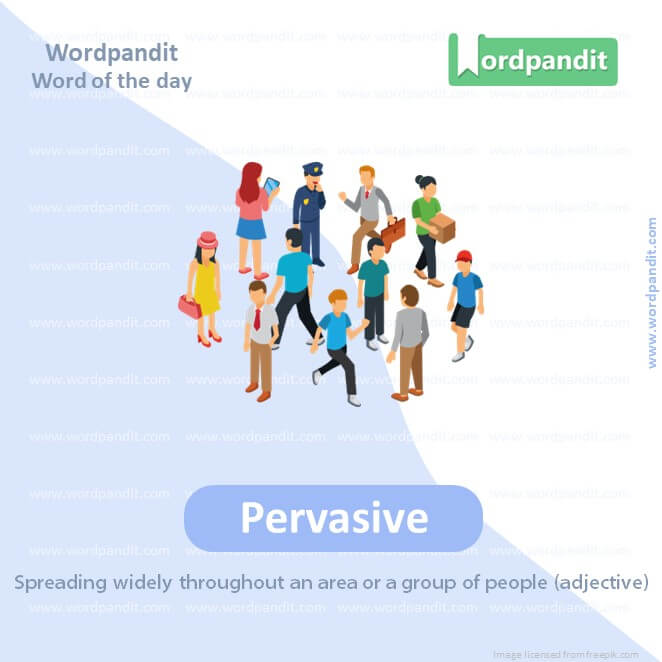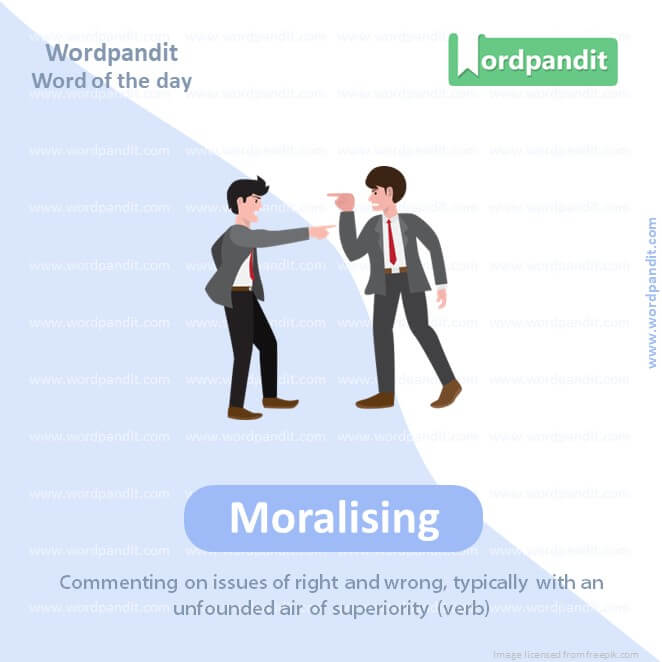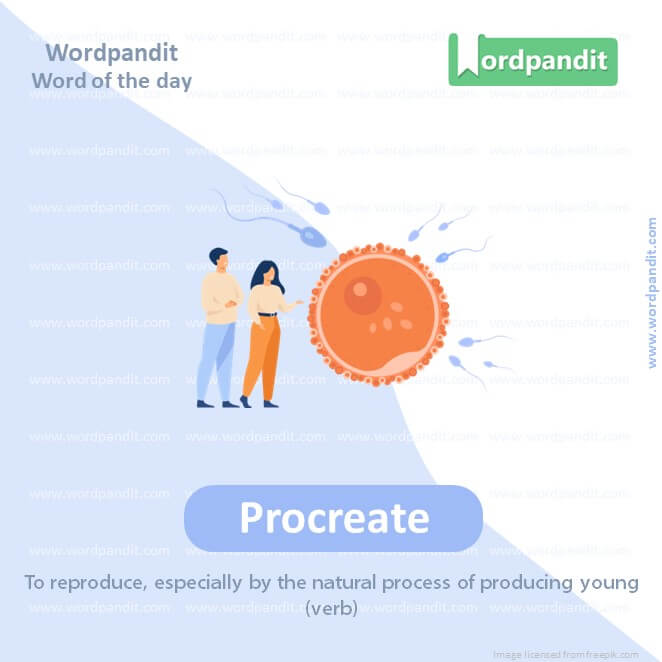Daily Vocabulary Words: List of Daily Used Words in Leading International Newspapers
Hi there. Welcome to this special section @ Wordpandit.
Our endeavour here is very simple: to highlight important daily vocabulary words, which you would come across in leading newspapers in the country. We have included the following newspapers in our selection:
• The New York Times
• The Washington Post
• Scientific American
• BBC
• The Guardian
• Psychology Today
• Wall Street Journal
• The Economist
We are putting in extensive work for developing your vocabulary. All you have got to do is be regular with this section and check out this post on a daily basis. This is your repository of words that are commonly used and essentially, we are posting a list of daily used words. Hence, this has significant practical application as it teaches you words that are used commonly in leading publications mentioned above.
Visit the website daily to learn words from leading international newspapers.

WORD-1: Pervasive
CONTEXT: There are mothers and then there are women who have abortions. It might be the most powerful and pervasive myth anti-abortion lobbyists, politicians and their disciples have ever authored. When every termination becomes a decision to reject motherhood, moralising becomes simple.
EXPLANATORY PARAGRAPH: Pervasive is like something that is everywhere around you. It’s like if the smell of cookies is all over the house, you can smell it in every room.
MEANING: Spreading widely throughout an area or a group of people (adjective).
PRONUNCIATION: per-vay-siv
SYNONYMS: Widespread, Common, Ubiquitous, Omnipresent, Prevalent
USAGE EXAMPLES:
1. The smell of flowers was pervasive in the garden.
2. There is a pervasive idea that superheroes always win.
3. The music had a pervasive influence on his mood.
4. Pervasive technology affects every part of our lives.
WORD-2: Myth
CONTEXT: There are mothers and then there are women who have abortions. It might be the most powerful and pervasive myth anti-abortion lobbyists, politicians and their disciples have ever authored. When every termination becomes a decision to reject motherhood, moralising becomes simple.
EXPLANATORY PARAGRAPH: A myth is a story that people tell that might have magic or amazing things, but it’s not really true. It’s like a fairy tale or a legend.
MEANING: A traditional story, especially one concerning the early history of a people or explaining a natural or social phenomenon, typically involving supernatural beings or events (noun).
PRONUNCIATION: mith
SYNONYMS: Legend, Folklore, Fable, Tale, Fantasy
USAGE EXAMPLES:
1. The Greek myth of Hercules is famous.
2. She loved reading myths about dragons and giants.
3. Myths often explain how something in nature was created.
4. The myth of the Phoenix talks about a bird that is reborn.

WORD-3: Anti-abortion
CONTEXT: There are mothers and then there are women who have abortions. It might be the most powerful and pervasive myth anti-abortion lobbyists, politicians and their disciples have ever authored. When every termination becomes a decision to reject motherhood, moralising becomes simple.
EXPLANATORY PARAGRAPH: Anti-abortion means not supporting or being against the idea that someone can choose to end a pregnancy. It’s like saying no to the choice of stopping a baby from being born.
MEANING: Opposed to the belief or practice of ending a pregnancy (adjective).
PRONUNCIATION: an-tee-uh-bor-shuhn
SYNONYMS: Pro-life, Against Abortion, Anti-choice, Non-supportive of Abortion, Abortion-Opposing
USAGE EXAMPLES:
1. The anti-abortion rally attracted many people.
2. She expressed her anti-abortion views during the discussion.
3. The legislation was supported by anti-abortion groups.
4. He wrote an article explaining his anti-abortion stance.
WORD-4: Lobbyists
CONTEXT:There are mothers and then there are women who have abortions. It might be the most powerful and pervasive myth anti-abortion lobbyists, politicians and their disciples have ever authored. When every termination becomes a decision to reject motherhood, moralising becomes simple.
EXPLANATORY PARAGRAPH: Lobbyists are people who try to convince the leaders in government to make decisions that they think are good. It’s like if you tried to convince your teacher to have more playtime.
MEANING: People who try to influence legislators or other public officials in favor of a specific cause or policy (noun).
PRONUNCIATION: lob-ee-ists
SYNONYMS: Advocates, Representatives, Campaigners, Influencers, Pressure Groups
USAGE EXAMPLES:
1. Lobbyists were working to change the law.
2. Environmental lobbyists met with the mayor.
3. The company hired lobbyists to represent their interests.
4. Lobbyists often attend meetings at the parliament.

WORD-5: Termination
CONTEXT: There are mothers and then there are women who have abortions. It might be the most powerful and pervasive myth anti-abortion lobbyists, politicians and their disciples have ever authored. When every termination becomes a decision to reject motherhood, moralising becomes simple.
EXPLANATORY PARAGRAPH: Termination means the end of something. It’s like when you finish a game, and it’s time to stop playing because the game is over.
MEANING: The act of ending something or coming to an end (noun).
PRONUNCIATION: ter-muh-nay-shuhn
SYNONYMS: End, Conclusion, Cessation, Finale, Discontinuation
USAGE EXAMPLES:
1. The termination of the project was announced yesterday.
2. His employment faced termination.
3. The contract had a termination date.
4. The termination of the agreement was unexpected.

WORD-6: Moralising
CONTEXT: There are mothers and then there are women who have abortions. It might be the most powerful and pervasive myth anti-abortion lobbyists, politicians and their disciples have ever authored. When every termination becomes a decision to reject motherhood, moralising becomes simple.
EXPLANATORY PARAGRAPH: Moralising is when someone talks about what is right or wrong in a way that sounds like teaching or giving a lesson. It’s like when someone tells you why sharing is good and being selfish is bad.
MEANING: Commenting on issues of right and wrong, typically with an unfounded air of superiority (verb).
PRONUNCIATION: mor-uh-ly-zing
SYNONYMS: Preaching, Lecturing, Sermonizing, Judging, Ethicizing
USAGE EXAMPLES:
1. The story ended with a moralising lesson.
2. He was known for moralising about honesty.
3. The teacher’s moralising speech made the students think.
4. She disliked his moralising tone.

WORD-7: Procreate
CONTEXT: Mothers procreate – the virtuous archetype Virgin Mary didn’t even fornicate to do so – while women who have abortions have sex for pleasure, selfishly devouring the forbidden as Eve did.
EXPLANATORY PARAGRAPH: Procreate means to have babies. It’s like when animals or people have little ones that are like them.
MEANING: To reproduce, especially by the natural process of producing young (verb).
PRONUNCIATION: pro-kree-ate
SYNONYMS: Reproduce, Breed, Multiply, Beget, Propagate
USAGE EXAMPLES:
1. Many animals procreate in the spring.
2. The couple wanted to procreate and start a family.
3. Plants also procreate by spreading seeds.
4. The documentary showed how different species procreate.
WORD-8: Virtuous
CONTEXT: Mothers procreate – the virtuous archetype Virgin Mary didn’t even fornicate to do so – while women who have abortions have sex for pleasure, selfishly devouring the forbidden as Eve did.
EXPLANATORY PARAGRAPH: Virtuous means being very good and doing the right thing. It’s like always telling the truth, being kind, and helping others.
MEANING: Having or showing high moral standards (adjective).
PRONUNCIATION: ver-choo-us
SYNONYMS: Righteous, Ethical, Noble, Upright, Honorable
USAGE EXAMPLES:
1. She was known for her virtuous behavior.
2. The virtuous knight saved the village.
3. He led a virtuous and honest life.
4. Stories often tell about virtuous heroes.
WORD-9: Archetype
CONTEXT: Mothers procreate – the virtuous archetype Virgin Mary didn’t even fornicate to do so – while women who have abortions have sex for pleasure, selfishly devouring the forbidden as Eve did.
EXPLANATORY PARAGRAPH: An archetype is like a perfect example or a typical version of something. It’s like the idea of a hero who is always brave and good.
MEANING: A very typical example of a certain person or thing; an original model on which others are copied (noun).
PRONUNCIATION: ar-ki-type
SYNONYMS: Prototype, Model, Standard, Epitome, Ideal
USAGE EXAMPLES:
1. Superman is an archetype of a superhero.
2. The wise old man is an archetype in many stories.
3. Her character in the play was the archetype of a villain.
4. The building is an archetype of modern architecture.
WORD-10: Devouring
CONTEXT: Mothers procreate – the virtuous archetype Virgin Mary didn’t even fornicate to do so – while women who have abortions have sex for pleasure, selfishly devouring the forbidden as Eve did.
EXPLANATORY PARAGRAPH: Devouring means eating something really quickly and eagerly, like when you’re very hungry and eat your favorite food fast.
MEANING: To eat food quickly and eagerly (verb).
PRONUNCIATION: dih-vow-er-ing
SYNONYMS: Consuming, Gobbling, Ingesting, Ravenously Eating, Wolfing Down
USAGE EXAMPLES:
1. The child was devouring his ice cream.
2. She started devouring the book as soon as she got it.
3. The dog was devouring its meal hungrily.
4. He spent the evening devouring pizza.
Vocabulary Words for IELTS'
Preparing for an esteemed examination like IELTS urges a diligent focus on ‘vocabulary words for IELTS’. These specific words, frequently prominent in IELTS examinations, play a vital role in expressing ideas effectively and articulately. To successfully conquer ‘vocabulary words for IELTS’, a strategic and focused approach is quintessential.
A fundamental step when learning ‘vocabulary words for IELTS’ is understanding these words in the context of use. For this, exposure to diverse resources like newspapers, journals, academic texts, and digital content is crucial. This engagement aids in understanding the nuances of these words, fortifying your preparation for ‘vocabulary words for IELTS’.
When tackling ‘vocabulary words for IELTS’, regular practice is the cornerstone of success. Consistent writing and speaking exercises help in embedding this vocabulary in your linguistic repertoire. Take situations or topics that commonly appear in the IELTS exam and practice crafting complex yet coherent sentences using these words.
In the journey to unfold ‘vocabulary words for IELTS’, making use of memory-enhancement techniques can orchestrate your success. Tools like flashcards and recall-based applications can significantly assist in retaining and reinforcing these words in your memory. Additionally, forming personal connections or stories with these words can greatly improve word recall.
Brevity is equally significant when preparing for ‘vocabulary words for IELTS’. Attempt to learn a limited number of words each day rather than tackling a large list all at once. This habit allows the brain adequate time to absorb and store these words securely, ensuring an effective learning experience.
In conclusion, the quest to master ‘vocabulary words for IELTS’ is an engaging dance of comprehension, practice, memory techniques, and thoughtful pacing. As you pirouette gracefully through these strategies, you’ll find communicating your IELTS responses with the right ‘vocabulary words for IELTS’ is less of a cliffhanger and more of an epic tale of language success.











